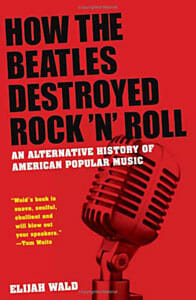
Pop historian’s latest bombshell essential despite its flaws
In 2004, music writer Elijah Wald released Escaping The Delta: Robert Johnson and the Invention of the Blues, which trenchantly revised decades of mythology masquerading as history. “As far as the evolution of black music goes, Robert Johnson was an extremely minor figure,” Wald argued, “and very little that happened in the decades following his death would have been affected if he had never played a note.” The book wasn’t a hatchet job—more like reconstructive surgery to remove decades of conventional wisdom from our collective consciousness.
Now Wald is back with an even more ambitious—and potentially more incendiary—volume called How the Beatles Destroyed Rock ’n’ Roll: An Alternative History of American Popular Music. In the course of 254 pages, Wald makes room for the fox trot, the turkey trot, the bunny hug, the jitterbug, brass bands, swing bands, racism, prohibition, jukeboxes, phonographs, radio payola and even disco balls (which, he notes in one of many interesting asides, were common in the 1920s). What he doesn’t cover in satisfactory depth is how, exactly, the Beatles destroyed rock ’n’ roll. It’s understandable that he didn’t name his new hardback How Popular Music From 1890 to 1970 Stopped Being Racially Miscegenated Dance Music Played By Live Bands For Live Audiences, and Started Being Racially Segregated Music Designed For Private Listening, as Eventually Typified By The Beatles—but that is the book we have here, a fascinating and scrupulous piece of pop scholarship that’s nonetheless maddening for failing to deliver on its title.
The book begins bravely. It takes chutzpah to suggest, in a text aimed at record geeks, that pop music began its decline with the invention of the phonograph. But that’s Wald’s contention in chapter 1, and he’s convincing. For much of the 20th century, he notes with cool detachment, “records remained relatively unimportant. We tend to give them a lot of historical weight because we still have them, but for their first half century they were considered brief, fuzzy snapshots of popular music, not the thing itself. Live performances, most of them by players and singers who would never be recorded, remained the norm—indeed, the whole idea of ‘live music’ did not arrive until well after the dawn of recording, as until then there had been no dead music.”
He goes on to argue that records eventually ossified freewheeling live performances. Before vinyl became popular, soloists could improvise from night to night. After audiences became accustomed to a particular recorded version, that’s the only way they wanted to hear the song played. Recorded sound also crippled the idea of music as a social soundtrack with songs performed by and for local amateurs who could play any number of genres, black music or white. As pop music became more professionalized after the swing era died, black music evolved into R&B, funk and hip-hop, while white Americans sat at home listening to Bing Crosby, then Sinatra, then Elvis and then The Beatles, who—by the end of their career—had stopped bothering to perform outside the studio.
“By the time the Beatles hit,” Wald writes, “still playing the rhythms of Chuck Berry and Carl Perkins, that style was already archaic and their contributions were to resegregate the pop charts by distracting white kids from the innovations of the soul masters, to diffuse rock’s energy with effetely sentimental ballads like ‘Yesterday’—paving the way for Simon and Garfunkel, Crosby, Stills and Nash, Elton John, and Billy Joel—and then to drape it in a robe of arty mystification, opening the way for the Velvet Underground, Pink Floyd, Yes, and Emerson, Lake and Palmer.” It’s a tantalizing argument, a salvo fired on page 5. Unfortunately, Wald’s lone chapter on The Beatles begins on page 230. Pretty soon, the book’s over.
That’s a shame because—even if you concede Wald’s point about the death of rock ’n’ roll—you barely get to hear him discuss the aftermath. Music history has marched on for about 40 years since The Beatles called it quits. The album era they ushered in has collapsed as digital consumers forced the record business back to a singles-based economy, just like it was before the Fab Four. And several prominent musicians of more recent vintage—starting with the Grateful Dead (who mattered solely as a concert band), Prince (who fused guitar acrobatics with R&B sensuality) and Eminem (who turned hip-hop’s race dynamics upside down)—further complicate Wald’s theories about pop segregation and the irrelevance of live music.
It’s one thing to say The Beatles destroyed rock ’n’ roll. It’d be even bolder to survey the current landscape and conclude that popular music would be essentially the same if they, like Robert Johnson, had never played a note.